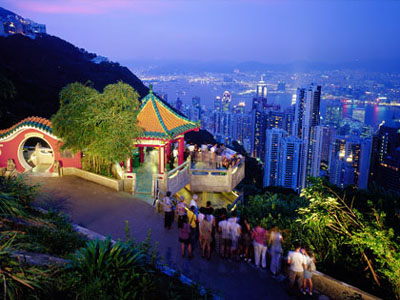Home ::Travel Destinations ::Hong Kong
Hong Kong

The Hong Kong is one of two special administrative regions (SARs) of the People's Republic of China (PRC), the other being Macau. Situated on China's south coast and enclosed by the Pearl River Delta and South China Sea, it is renowned for its expansive skyline and deep natural harbour. With a land mass of 1,104 km2 (426 sq mi) and a population of seven million people, Hong Kong is one of the most densely populated areas in the world. Hong Kong's population is 95 percent ethnic Chinese and 5 percent from other groups. Hong Kong's Han Chinese majority originate mainly from the cities of Guangzhou and Taishan in the neighbouring Guangdong province.
The Hong Kong became a colony of the British Empire after the First Opium War (1839–42). Originally confined to Hong Kong Island, the colony's boundaries were extended in stages to the Kowloon Peninsula and the New Territories by 1898. It was occupied by Japan during the Pacific War, after which the British resumed control until 1997, when China regained sovereignty. The region espoused minimum government intervention under the ethos of positive non-interventionism during the colonial era. The time period greatly influenced the current culture of Hong Kong, often described as "East meets West", and the educational system, which used to loosely follow the system in England until reforms implemented in 2009.
Under the principle of "one country, two systems", The Hong Kong has a different political system from mainland China. Hong Kong's independent judiciary functions under the common law framework. The Basic Law of Hong Kong, its constitutional document, which stipulates that Hong Kong shall have a "high degree of autonomy" in all matters except foreign relations and military defence, governs its political system. Although it has a burgeoning multi-party system, a small-circle electorate controls half of its legislature. An 800-person Election Committee selects the Chief Executive of Hong Kong, the head of government.
As one of the world's leading international financial centres, The Hong Kong has a major capitalist service economy characterised by low taxation and free trade, and the currency, Hong Kong dollar, is the ninth most traded currency in the world. The lack of space caused demand for denser constructions, which developed the city to a centre for modern architecture and the world's most vertical city.The dense space also led to a highly developed transportation network with public transport travelling rate exceeding 90 percent, the highest in the world. Hong Kong has numerous high international rankings in various aspects. For instance, its economic freedom, financial and economic competitiveness, quality of life, corruption perception, Human Development Index, etc., are all ranked highly.
The Hong Kong is situated on China's south coast, 60 km (37 miles) east of Macau on the opposite side of the Pearl River Delta. It is surrounded by the South China Sea on the east, south, and west, and borders the Guangdong city of Shenzhen to the north over the Shenzhen River. The territory's 1,104 km2 (426 sq mi) area consists of Hong Kong Island, the Kowloon Peninsula, the New Territories, and over 200 offshore islands, of which the largest is Lantau Island. Of the total area, 1,054 km2 (407 sq mi) is land and 50 km2 (19 sq mi) is inland water. Hong Kong claims territorial waters to a distance of 3 nautical miles (5.6 km). Its land area makes Hong Kong the 179th largest inhabited territory in the world.
As much of Hong Kong's terrain is hilly to mountainous with steep slopes, less than 25% of the territory's landmass is developed, and about 40% of the remaining land area is reserved as country parks and nature reserves. Most of the territory's urban development exists on Kowloon peninsula, along the northern edge of Hong Kong Island, and in scattered settlements throughout the New Territories.The highest elevation in the territory is at Tai Mo Shan, 957 metres (3,140 ft) above sea level. Hong Kong's long and irregular coast provides it with many bays, rivers and beaches.
 Despite the Hong Kong's reputation of being intensely urbanised, the territory has tried to promote a green environment, and recent growing public concern has prompted the severe restriction of further land reclamation from Victoria Harbor. Awareness of the environment is growing as Hong Kong suffers from increasing pollution compounded by its geography and tall buildings. Approximately 80% of the city's smog originates from other parts of the Pearl River Delta.
Despite the Hong Kong's reputation of being intensely urbanised, the territory has tried to promote a green environment, and recent growing public concern has prompted the severe restriction of further land reclamation from Victoria Harbor. Awareness of the environment is growing as Hong Kong suffers from increasing pollution compounded by its geography and tall buildings. Approximately 80% of the city's smog originates from other parts of the Pearl River Delta.
Though it is situated just south of the Tropic of Cancer, The Hong Kong has a humid subtropical climate (Köppen Cwa). The summer is hot and humid with occasional showers and thunderstorms, and warm air coming from the southwest. Summer is when typhoons are most likely, sometimes resulting in flooding or landslides.. Winters are mild and usually start sunny, becoming cloudier towards February; the occasional cold front brings strong, cooling winds from the north. The most temperate seasons are spring, which can be changeable, and autumn, which is generally sunny and dry.Hong Kong averages 1,948 hours of sunshine per year, while the highest and lowest ever recorded temperatures at the Hong Kong Observatory are 36.1 °C (97.0 °F) and 0.0 °C (32.0 °F), respectively.



